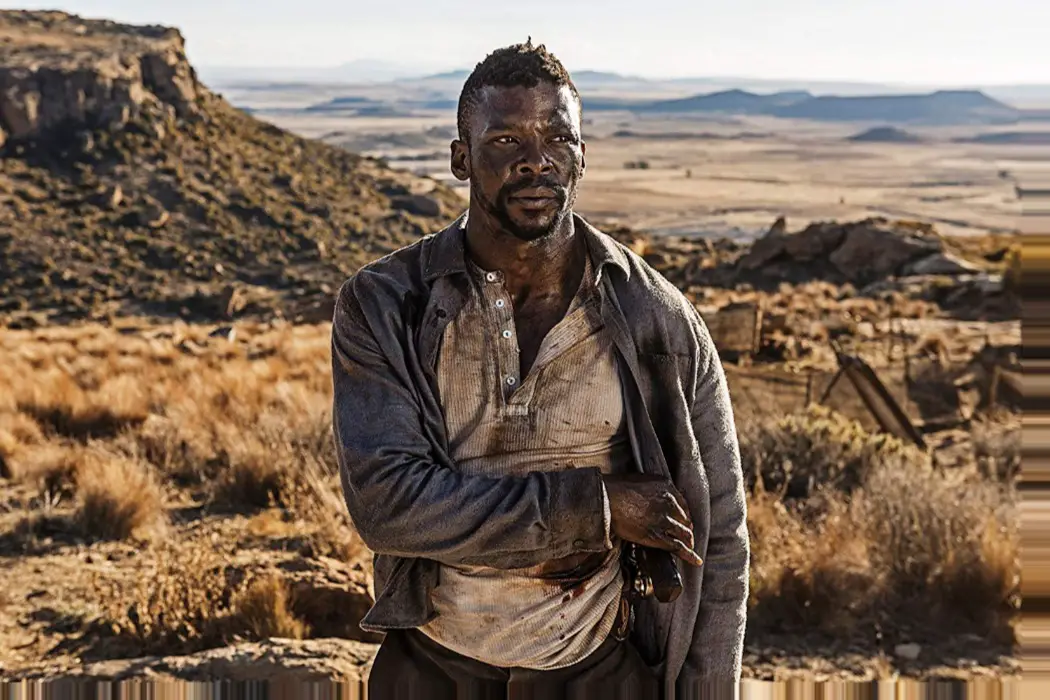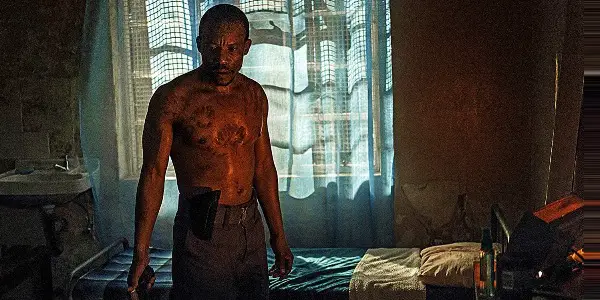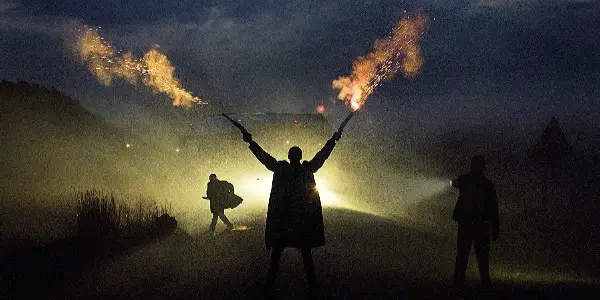FIVE FINGERS FOR MARSEILLES: A South African Western Living In The Shadow Of Its Influences

Alistair is a 25 year old writer based in Cambridge.…
Although it’s not the first western to take advantage of South Africa’s stunning scenery by making it a double for the American west, Five Fingers for Marseilles is the first distinctively South African western. Telling a story about a former gang member returning to the rural village he grew up in only to be faced with a far greater threat than the reason he fled in the first place, its story neatly fits within the genre’s most simplistic narrative template – a rare modern western that, despite its novel setting, couldn’t be described as “revisionist” in any way.
All the familiar tropes, with only a faint polish
Director Michael Matthews, making his film debut, clearly has an affinity for the genre, and he skilfully applies all the expected tropes with enough polish to make them feel fresh, and even slightly thrilling. But it’s this same reverence for the lineage of cinematic westerns that proves to be where the film falters. Many viewers will have a dawning realisation while viewing that, despite the unique setting giving the appearance of breathing new life into the storytelling formula, it plays it so close to expectations that the only surprise is the thudding anti-climax it builds towards.

Five Fingers for Marseilles opens with a unique flourish it does little to capitalise on, with a prologue set in the final days of Apartheid. In Marseilles, a railroad town in South Africa’s Eastern Cape, a child gang known as the “five fingers” fight the oppression forced onto them by the white police officers who patrol the area. One day, a member of the gang gets arrested, and young Tau manages to kill two officers. He immediately flees the village – and then we pick up two decades later, where Tau (now played by Vuyo Dabula) is returning in the hopes of resuming a quiet life in the village, now that the horrors of apartheid and his involvement in a major criminal incident there are both safely in the past.
The only problem is his life of crime continued in the two decades after he fled, and he’s only making his return after hastily disavowing his previous actions and attempting to turn over a new leaf. But there’s only so long he can stay quiet, after finding out that his former gang members have taken control of the town, either via political means (Kenneth Nkosi plays Bongani, the idealistic town mayor), or by rising up the ranks to become the voice of authority elsewhere (Luyanda, the police chief played by Mduduzi Mabaso).
As children, the gang was bonded by a distrust of oppressive authority – but as an adult, Tau is now faced with seeing his former friends making deals with the devil to cease control and revel in their corrupt spoils for themselves. The community is being threatened by their actions, and their childhood bonds aren’t going to stop Tau doing what he believes is right.
An intriguing backdrop that remains unexplored
Despite the political intrigue this setup suggests, as well as the unique nature of a western dealing with social conflicts in post-Apartheid South Africa, Five Fingers for Marseilles doesn’t delve into this intriguing context head on. Instead, it exists as an unexplored backdrop; the story can’t exist without it, even though Matthews stubbornly seems uninterested in acknowledging it, preferring to stick to only view it peripherally through the rose-tinted lenses of familiar western tropes and iconography.
The pathway is cleared for him to add a new dimension to the established conventions, and yet he sticks firmly in the safety of his cineliteracy, paying tribute to genre classics while doing nothing to make his own film feel distinctive.

Matthews is clearly a talented director, and is fantastic at getting performances from his cast that fluctuate between low-key emoting and melodramatic anguish at the tip of a hat. He’s also adept at creating slow-burning tension, slowly unveiling the scale of small town corruption in latter day Marseilles. He’s a master craftsman – but there is no personality behind the craft that would help elevate it further. All the ingredients for a rip-roaring Western are here, but at a certain point, it becomes a box ticking exercise, seeing how many familiar tropes can be included without stretching the unspoken socio-political credulity beyond breaking point.
Five Fingers for Marseilles: Conclusion
You may be entertained while in the company of Five Fingers for Marseilles – after all, Matthews has seen enough westerns to know what constitutes a successful one. But I’d be surprised if it stays with audiences after viewing, or if their memories will be diverted back to the Sergio Leone westerns that were a clear influence on the slow burning brutality here. Writing this only a few days after viewing it has proved that it has very little staying power due to a lack of distinctive personality; it’s difficult to mention without referring to the genre hallmarks it remains in the shadows of throughout.
Maybe if the director, working with his regular screenwriter Sean Drummond, had dared to delve deeper into a political backdrop instead of simplifying it so it neatly fitted within the western genre, this could have been something special. As it stands, it’s sporadically entertaining while watching, but devoid of the food for thought a film with this subject matter urgently needs.
Five Fingers for Marseilles is released in the USA on September 7.
Does content like this matter to you?
Become a Member and support film journalism. Unlock access to all of Film Inquiry`s great articles. Join a community of like-minded readers who are passionate about cinema - get access to our private members Network, give back to independent filmmakers, and more.
Alistair is a 25 year old writer based in Cambridge. He has been writing about film since the start of 2014, and in addition to Film Inquiry, regularly contributes to Gay Essential and The Digital Fix, with additional bylines in Film Stories, the BFI and Vague Visages. Because of his work for Film Inquiry, he is a recognised member of GALECA, the Gay & Lesbian Entertainment Critics' Association.













